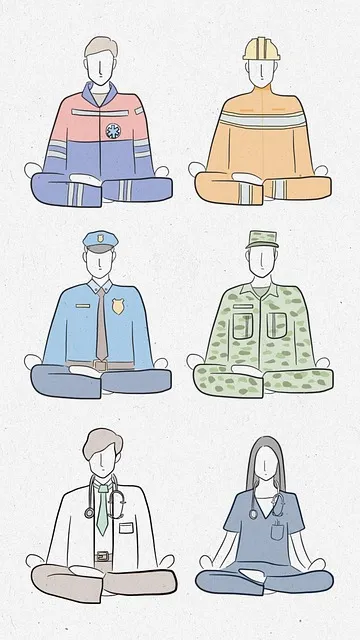Aurora Kaiser Permanente leads in community mental healthcare through its innovative Crisis Intervention Team (CIT) program. This holistic training framework combines evidence-based practices with multidisciplinary strategies, empowering healthcare professionals to manage diverse psychological crises effectively. By focusing on de-escalation, post-crisis support, and emotional intelligence, along with mindfulness meditation, the program enhances both caregiver and patient emotional healing. CIT training, like that provided by Aurora Kaiser Permanente, is transforming communities nationwide, promoting a culture of mental health support, improving access to immediate assistance, and strengthening healthcare systems to cater to all during vulnerable times.
“Crisis intervention teams (CITS) play a pivotal role in mental health care, providing immediate support during crises. This article explores the vital training programs behind these essential services. We delve into the Aurora Kaiser Permanente model, renowned for its comprehensive approach, and highlight key components for effective CIT training. Furthermore, we examine the profound benefits and impact of such programs, emphasizing their role in preparing communities to address mental health crises more effectively.”
- Understanding Crisis Intervention Teams: A Essential Role in Mental Health Care
- The Aurora Kaiser Permanente Model: A Comprehensive Training Approach
- Key Components of Effective Crisis Intervention Team Training Programs
- Benefits and Impact: Preparing Communities for Mental Health Crises
Understanding Crisis Intervention Teams: A Essential Role in Mental Health Care

Crisis Intervention Teams (CITs) play a vital role in mental health care, especially in communities like Aurora, where Kaiser Permanente offers specialized services. These teams are designed to respond swiftly and effectively during times of crisis, providing immediate support to individuals experiencing emotional distress or psychological trauma. The primary goal is to de-escalate situations, offer guidance, and prevent potential harm to the individual and others around them.
Training programs for CITs focus on building resilience in both team members and those they serve. By equipping professionals with the necessary skills, Aurora Kaiser Permanente promotes better stress management and enhances public awareness campaigns development related to mental health issues. This proactive approach ensures that crisis situations are handled with care and efficiency, fostering a healthier and more supportive community environment.
The Aurora Kaiser Permanente Model: A Comprehensive Training Approach

The Aurora Kaiser Permanente Model stands out as a comprehensive training approach for crisis intervention team programs, emphasizing holistic mental health support. This model integrates evidence-based practices with a collaborative, multidisciplinary strategy, ensuring that healthcare professionals are equipped to handle various psychological crises effectively. By fostering a culture of positive thinking and mental health awareness within the organization, Aurora Kaiser Permanente promotes a proactive Risk Management Planning for Mental Health Professionals.
Through this approach, team members gain not just technical skills but also enhanced emotional resilience, enabling them to provide empathetic care in high-pressure situations. The program’s focus on continuous learning and adaptation ensures that practices remain current with the latest research, reflecting the evolving landscape of mental health awareness.
Key Components of Effective Crisis Intervention Team Training Programs

Effective crisis intervention team (CIT) training programs are pivotal in equipping healthcare professionals to handle mental health crises with empathy and efficiency. Key components include comprehensive curriculum covering various aspects of crisis management, from de-escalation techniques to post-crisis support strategies. Training should emphasize emotional intelligence, teaching participants to recognize and respond to the nuanced emotional states of individuals in distress.
The integration of mindfulness meditation practices within these programs has proven beneficial. It empowers professionals to cultivate present-moment awareness, enabling them to make clear decisions and provide compassionate care during high-stress situations. The Aurora Kaiser Permanente mental health initiative, for instance, highlights the importance of such holistic training, focusing not only on technical skills but also on the emotional healing processes essential for both the caregiver and the patient.
Benefits and Impact: Preparing Communities for Mental Health Crises

Crisis intervention team training programs are transforming communities across the country, equipping everyday individuals with the skills to recognize and respond to mental health crises. These initiatives, such as those offered by Aurora Kaiser Permanente, play a pivotal role in enhancing community resilience and fostering a culture of support for mental well-being. By training healthcare providers and community members alike, these programs ensure that everyone is prepared to navigate the complexities of mental health emergences.
The benefits are multifaceted: from improving access to immediate assistance during crises to promoting positive thinking and emotional healing processes within communities. Through cultural competency training, participants gain a deeper understanding of diverse perspectives and needs, enabling them to offer tailored support. This holistic approach not only empowers individuals but also strengthens the overall healthcare system, ensuring that everyone receives the care they need in their time of vulnerability.
Crisis intervention team (CIT) training programs, as exemplified by the Aurora Kaiser Permanente model, play a pivotal role in enhancing mental health care. By focusing on comprehensive training that incorporates key components like situational awareness, de-escalation techniques, and cultural sensitivity, these programs empower healthcare professionals to effectively navigate and resolve mental health crises. The benefits extend beyond individual patients, fostering more resilient communities better equipped to handle sudden and severe mental health challenges. Embracing such innovative training approaches is crucial in ensuring quality care and improving outcomes for those facing mental health emergencies, particularly within the context of Aurora Kaiser Permanente’s commitment to comprehensive mental health services.






